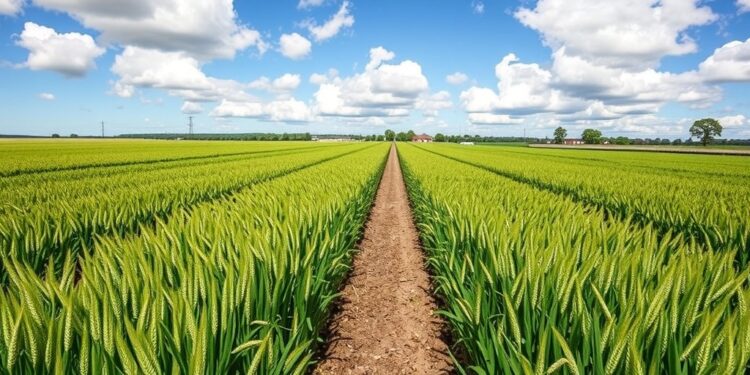In light of the ongoing transformation brought about by climate change, the agricultural landscape of the UK is poised to undergo a profound metamorphosis by the year 2080. Researchers from the UK Centre for Ecology & Hydrology (UKCEH) and the University of East Anglia (UEA) have been at the forefront of a groundbreaking study that explores the potential for a diverse range of crops—such as chickpeas, soybeans, and even citrus fruits—to be successfully cultivated across the UK. This study unveils the dual nature of climate change as both a challenge and an opportunity for the agriculture sector.
The core of this research revolves around the evaluation of over 160 different food crops, focusing specifically on their suitability for cultivation under various projected scenarios of global warming. The researchers meticulously assessed the temperature increases of 2 and 4 degrees Celsius above pre-industrial levels, thereby providing a comprehensive overview of how different regions within the UK may adapt to these changes. The significance of this assessment lies in its granularity; it offers mapped projections at a 1km square level, granting critical information relevant for farmers and stakeholders in the food production chain.
As temperatures rise, certain traditional crops that previously thrived in warmer climates might find a new home in the UK. The researchers emphasize that while climate change poses significant risks, such as the increased prevalence of pests and extreme weather conditions, it equally creates opportunities for diversifying crops beyond the conventional staples like wheat and strawberries. This shift toward adopting new crop varieties not only stands to increase agricultural resilience but also to address the escalating global food demand fueled by population growth.
The study highlights the need for strategic adjustments in farming practices to accommodate these changes. Dr. John Redhead, the lead author of the study, articulates the urgency for the agricultural sector to become adaptable. Modern farming could incorporate alternative crops that are more suited to the anticipated climatic conditions, ultimately creating an agricultural ecosystem that is more robust against the disturbances associated with climate change.
The implications of this research extend far beyond merely growing a different selection of crops. A diversified agricultural approach can also contribute positively to environmental sustainability and dietary health. For instance, incorporating legumes like chickpeas and soybeans into the farming mix not only diversifies the food supply but also bolsters soil health through natural nitrogen fixation. This practice reduces dependence on synthetic fertilizers, thereby mitigating the environmental toll of intensive agriculture.
However, this potential for crop diversification is not without challenges. Key agricultural regions, particularly in the South East and East Anglia, may find the conditions less favorable for traditional crops under the warming scenarios evaluated. The study notes that wheat and strawberries could struggle in these areas as the climate becomes increasingly unsuitable. Conversely, regions such as the southwest and the Scottish borders might benefit from warmer temperatures, potentially transforming them into agricultural hubs for different crop varieties.
In response to these challenges, the authors of the study recommend several adaptive strategies. Enhanced research into the viability of the newly identified ‘winner’ crops is essential for guiding farmers as they transition away from traditional practices. Additionally, there needs to be a redesign of agricultural supply chains to facilitate the processing and distribution of these new crops from unconventional regions. The introduction of innovative agricultural methods, such as vertical farming and paludiculture—farming in wetland areas—could also offer viable solutions to various climate-induced challenges.
The study’s findings stress that while many areas may exhibit increased suitability for certain crops, logistical realities such as small field sizes and distance from existing food supply chains will complicate large-scale shifts in production. Economic considerations also play a crucial role; the transition to new agricultural practices involves financial implications that could deter farmers from embracing these necessary changes, thereby potentially prolonging reliance on outdated systems.
Addressing these multifaceted challenges requires not only localized efforts but also a reevaluation of current agricultural policies. Professor Rachel Warren, a co-author of the study, emphasizes the importance of providing farmers and policymakers with foresight to navigate these transitions effectively. Without comprehensive data on crop suitability for various regions, agricultural systems might remain ‘locked in’ to suboptimal practices that could further exacerbate climate vulnerabilities.
Looking to the future, this research provides essential insights for the agricultural community and beyond. As food production systems navigate the unpredictability brought on by climate change, there is a pressing need for coordination between scientists, farmers, researchers, and policymakers. Implementing the findings from this study can lead to actionable strategies, fostering a resilient food network that not only caters to shifting climate realities but also enhances overall food security and environmental health.
In summary, the implications of climate change for agriculture demand a pro-active approach that embraces diversity as a cornerstone of future farming practices. The study from UKCEH and UEA sheds light on the transformative potential of climate adaptation in agriculture, inviting stakeholders to rethink their strategies and policies in order to cultivate a sustainable future for food production in the UK.
Subject of Research: Agricultural adaptation to climate change in the UK
Article Title: National horizon-scanning for future crops under a changing UK climate
News Publication Date: 24-Jan-2025
Web References: DOI link
References: Redhead et al. 2025. National horizon-scanning for future crops under a changing UK climate. Climate Resilience and Sustainability. DOI: 10.1002/cli2.70007
Image Credits: Not specified
Keywords: Climate change, Agriculture, Crop diversity, Food security, Sustainable farming, Climate adaptation, UK agriculture, Agricultural resilience, Environmental sustainability, Food production.




